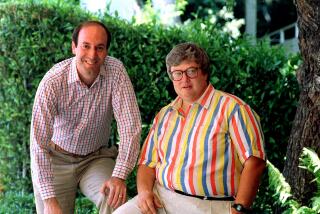A Flair for Controversy
- Share via
John Warwick Montgomery has gained a reputation as an evangelical scholar and teacher with a searing wit and a flair for controversy.
Described as a child prodigy with a quick intellect marked by a voracious reading habit, Montgomery specialized in Christian apologetics, or defense of the faith, taking up law in later life.
Fluent in several languages, including New Testament Greek, and known as a magnet for students interested in a lively discussion, he also became known as an irascible and eccentric character, colleagues said.
“He’s a personality,” said John Woodbridge, a former colleague who is a professor of church history at Trinity Evangelical Divinity School in Deerfield, Ill. “He’s a very intelligent, witty man who can be very caustic when he wants to be.”
On his radio program he handed out “legal loon” awards to “lampoon sloppy liberal thinking in the areas of theology and public life,” Montgomery said in a letter describing his new ministry.
He gained a notable following in the late 1960s for a series of debates with another theologian, Thomas J.J. Altizer, that probed the “is God dead?” controversy.
“He has the face and demeanor in a debate of an innocent sophomore until the fangs come out and you realize you’re dealing with a tiger,” said Walter Martin, founder of the Christian Research Institute, an Irvine organization that monitors cults.
The debates became the subject of one of Montgomery’s many books, which include “The Quest for Noah’s Ark,” “How Do We Know There Is a God?” and “Christianity for the Toughminded.” A native of Warsaw, N.Y., Montgomery attended Cornell University, winning distinctions in philosophy. He received a degree in library science at UC Berkeley and earned a Ph.D. in the same subject from the University of Chicago.
Montgomery was ordained a minister in the Lutheran Church-Missouri Synod in 1958, then traveled to Europe where he studied law and theology, earning two degrees from the University of Strasbourg in France, according to his biography.
As a teacher of the history of Christian thought at Trinity Evangelical Divinity School, Montgomery had “his own goals and sometimes seemed to many to be ruthlessly determined to push ahead with them,” recalled Kenneth Kantzer, who was dean at Trinity when Montgomery taught there. “You can look at that positively or you can say he was not as kindly or polite as he could have been.”
Colleagues Not Appreciative
Kantzer, currently chancellor at Trinity, remembered proposing that Montgomery be rehired after he left the school for a teaching stint elsewhere. Other faculty would not hear of it, he said. “His colleagues didn’t appreciate him. Some may have felt he tended to look down on them.”
Montgomery was a professor of history and law at George Mason University School of Law in Arlington, Va., and at Melodyland School of Theology in Anaheim before founding the Simon Greenleaf School of Law in 1980.
The Anaheim school, named for a 19th-Century lawyer and evangelical Christian, resulted from Montgomery’s conviction that the study of law cannot be divorced from the study of God, according to experts in the field.
“The school was developed to combine the study of law and theology out of a concern that most law schools today teach law that is heavily influenced by legal realism,” said Ed Larson, a professor of history and law at the University of Georgia who is familiar with Montgomery’s work.
The school “is an attempt to find out how God would want the laws of this country to operate. That is what he is interested in,” Larson said.
Both faculty and trustees at Greenleaf are required to affirm their belief in a literal interpretation of the Bible and the infallibility of the original Scriptures.
The school operated dual programs in law and apologetics. A popular part of its curriculum has been its annual 4-week summer program at the International Institute of Human Rights in Strasbourg, France.
More to Read
Sign up for our Book Club newsletter
Get the latest news, events and more from the Los Angeles Times Book Club, and help us get L.A. reading and talking.
You may occasionally receive promotional content from the Los Angeles Times.










